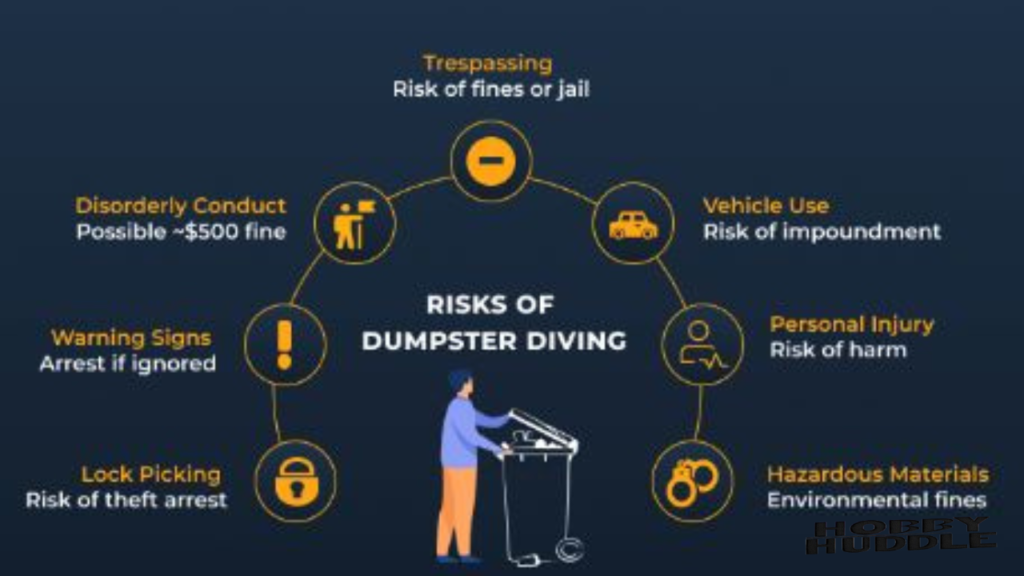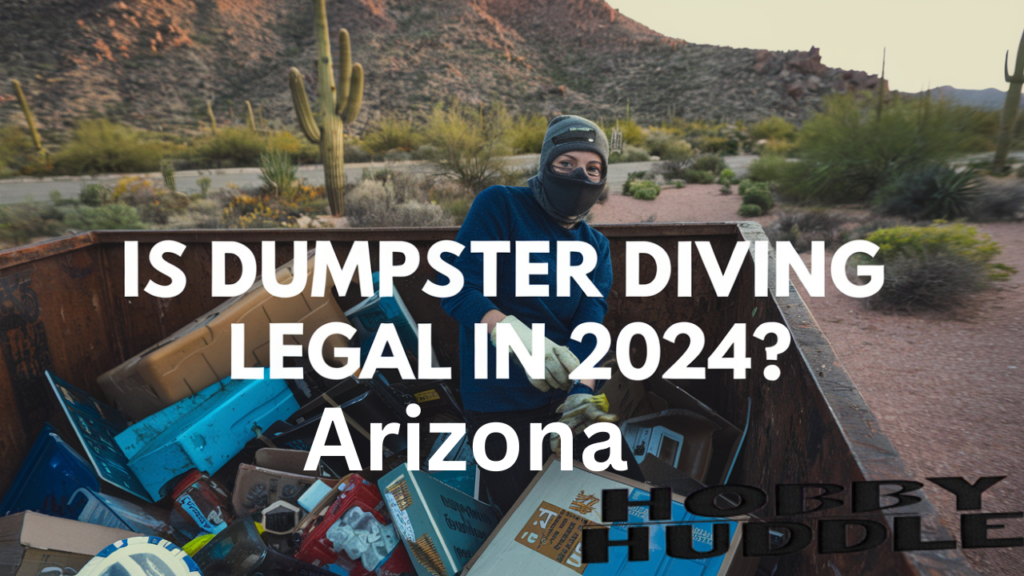Is dumpster diving legal in Arizona? This question has become increasingly relevant as more people embrace this unconventional practice. The legal status of dumpster diving in Arizona exists in a complex gray area, governed by various local ordinances and state regulations. While not explicitly illegal, several factors determine its legality.
Consider this scenario: Sarah Martinez, a Phoenix resident, regularly checks the dumpsters behind local retail stores. She’s careful to follow trespassing laws and only accesses containers on public property. This approach aligns with basic legal requirements.
| City | Local Ordinance Status | Permit Required | Special Restrictions |
|---|---|---|---|
| Phoenix | Limited Restrictions | No | No diving after 10 PM |
| Tucson | Moderate Control | Yes | Business permission needed |
| Scottsdale | Strict Rules | Yes | Limited to daylight hours |
| Mesa | Open Policy | No | Must clean area after diving |
| Tempe | Regulated | No | No commercial diving |
| Glendale | Partial Restrictions | No | Time restrictions apply |
| Chandler | Modified Rules | Yes | Registration required |
| Gilbert | Limited Access | No | Residential areas restricted |
| Peoria | Open Guidelines | No | Must report findings |
| Surprise | Controlled Access | Yes | Business zone permits needed |
You Might Like: Dumpster Diving At Bath And Body Works | An Ultimate Guide for 2024
Safety and Best Practices
Implementing proper safety tips remains crucial for any dumpster diving expedition. The practice requires more than just random searching – it demands careful planning and execution. Many successful divers maintain detailed logs of their findings and optimal timing.

Here’s an example from experienced diver Mike Thompson’s diary: “Tuesday, 3 PM – Checked the arts supply store dumpster on Main Street. Found $200 worth of unopened craft materials. Key observation: They dispose of display items every first week of the month.”
| Safety Equipment | Essential Purpose | Estimated Cost |
|---|---|---|
| Heavy Gloves | Hand Protection | $15-25 |
| Steel-Toe Boots | Foot Safety | $60-100 |
| Headlamp | Night Visibility | $20-40 |
| Grabber Tool | Reach Extension | $15-30 |
| First Aid Kit | Emergency Care | $25-45 |
| Reflective Vest | Visibility | $10-20 |
| Work Pants | Body Protection | $30-50 |
| Safety Glasses | Eye Protection | $15-25 |
| Hand Sanitizer | Hygiene | $5-10 |
| Sturdy Bags | Item Collection | $10-20 |
You Might Like: Dumpster Diving In Oklahoma | Is It Legal in 2024?
Profitable Urban Diving Locations
The best locations for dumpster diving in Arizona often yield surprising treasures. Dumpster diving hotspots typically include retail districts, university areas, and industrial parks. Understanding the regulations for dumpster diving helps identify optimal locations while staying within legal boundaries.

Yes, it is legal to dumpster dive in Arizona. In the state of Arizona, there are no specific laws that prohibit dumpster diving.
Emma Chen, a Tucson-based diver, shares her experience: “I focus on urban diving locations near the university district during move-out periods. Last semester, I furnished my entire apartment with high-quality items students couldn’t take home.”
| Location Type | Average Value Found | Best Timing |
|---|---|---|
| Retail Plaza | $50-200/week | Early Morning |
| University Area | $150-400/month | End of Semester |
| Office Complex | $75-250/week | Weekend Evening |
| Industrial Park | $100-300/week | Mid-Afternoon |
| Shopping Mall | $80-180/week | After Hours |
| Apartment Complex | $200-500/month | Month End |
| Electronics Store | $150-400/week | Inventory Days |
| Grocery Store | $60-150/week | Late Evening |
| Art Supply Store | $40-120/week | Display Changes |
| Furniture Store | $200-600/month | Seasonal Changes |
You Might Like: Dumpster Diving in Pennsylvania | Is It Legal in 2024?
Community Impact and Environmental Benefits
The practice of dumpster diving contributes significantly to environmental consciousness. By rescuing usable items from landfills, divers help reduce waste while building strong community relationships in diving. Many successful divers establish positive connections with local businesses.
Professional diver James Wilson demonstrates this approach through regular communication: “Dear Store Manager, I’ve been responsibly checking your store’s disposal area for the past six months. I always leave the area clean and only visit during agreed hours. Would you be open to a formal arrangement for checking discarded items?”
| Environmental Impact | Monthly Savings | Community Benefit |
|---|---|---|
| Reduced Landfill | 500-1000 lbs | Less Waste |
| Recycled Electronics | $200-400 | Tech Access |
| Saved Food | $300-600 | Food Banks |
| Furniture Rescue | $400-800 | Home Support |
| Paper Products | $50-150 | Resource Sharing |
| Clothing Items | $150-300 | Donation Network |
| Building Materials | $200-500 | DIY Projects |
| Art Supplies | $100-250 | Creative Reuse |
| Books/Media | $75-200 | Knowledge Share |
| Home Goods | $150-350 | Community Aid |
Risk Management and Rewards
Understanding the risks of dumpster diving at night helps maintain safety while maximizing potential earnings from dumpster diving. The financial rewards of dumpster diving can be substantial when approached strategically. Many successful divers report monthly savings exceeding $1,000 through careful planning and execution.
Managing abandoned property laws requires attention to detail. Local diver Lisa Rodriguez maintains professional documentation: “Found Items Log: Date, Time, Location, Item Description, Estimated Value, and Verification of Public Access.”
Remember that the future of dumpster diving depends on responsible practitioners who respect both local regulations and private property rights. Building positive relationships with businesses and communities ensures this practice remains viable for everyone interested in reducing waste while finding value in discarded items.
Seasonal Diving Opportunities
The climate in Arizona creates unique seasonal opportunities for dumpster diving enthusiasts. Summer months often yield different treasures compared to winter seasons. Understanding these patterns helps maximize successful finds while maintaining proper safety tips throughout the year.
Local diver Rachel Thompson shares her seasonal strategy: “During university move-out periods in May, I focus on campus areas. December brings retail opportunities, while March offers spring cleaning treasures in residential zones.”
| Season | Prime Locations | Expected Finds | Peak Hours |
|---|---|---|---|
| Summer | Shopping Centers | Electronics | Early Morning |
| Winter | Retail Districts | Holiday Items | Evening |
| Spring | Residential Areas | Furniture | Weekend Afternoon |
| Fall | University Zones | Textbooks | End of Term |
| Early Summer | Office Parks | Equipment | Friday Evening |
| Late Summer | Industrial Areas | Materials | Mid-Morning |
| Early Fall | Tech Districts | Gadgets | After Hours |
| Late Fall | Downtown Areas | Decorations | Pre-Dawn |
| Early Spring | Suburbs | Home Goods | Mid-Day |
| Late Spring | Art Districts | Supplies | Closing Time |
Digital Documentation Strategies
Modern best practices for dumpster diving include maintaining digital records. Many successful divers use mobile apps to track locations, timing, and findings. This systematic approach helps identify patterns and optimize future diving expeditions.
Consider this email template used by professional diver Marcus Chen: “Subject: Dumpster Diving Documentation Log – Week 32. Details: Located three premium locations in downtown Phoenix, documented findings worth $450, maintained full compliance with local ordinances.”
| Documentation Type | Digital Tool | Benefits |
|---|---|---|
| Location Tracking | GPS App | Route Optimization |
| Find Photography | Cloud Storage | Item Verification |
| Time Logging | Calendar App | Pattern Recognition |
| Value Assessment | Spreadsheet | Profit Tracking |
| Legal Compliance | Document Scanner | Permit Records |
| Contact Management | CRM Tool | Business Relations |
| Route Planning | Map Software | Efficiency |
| Inventory System | Database App | Stock Management |
| Schedule Tracking | Planner App | Time Optimization |
| Community Network | Social Platform | Information Sharing |
Building Professional Networks
Successful diving requires understanding community relationships in diving. Many experienced divers build networks with local businesses, forming mutually beneficial arrangements that respect both parties’ interests while adhering to trespassing laws.
Professional diver Alexandra Martinez demonstrates networking through formal communication: “Dear Business Owner, I’m writing to discuss establishing a structured arrangement for checking discarded materials. I maintain full insurance coverage and can provide references from similar arrangements.”
| Network Type | Relationship Benefits | Required Actions |
|---|---|---|
| Retail Stores | Regular Access | Weekly Check-ins |
| Restaurant Chains | Food Recovery | Health Certifications |
| Office Buildings | Electronic Items | Security Clearance |
| Art Galleries | Display Materials | Professional References |
| Educational Institutions | Seasonal Items | Background Check |
| Manufacturing Plants | Raw Materials | Safety Training |
| Distribution Centers | Overstock Items | Liability Insurance |
| Entertainment Venues | Event Materials | Scheduled Access |
| Medical Offices | Packaging Items | Confidentiality Agreement |
| Tech Companies | Outdated Equipment | Data Security Protocol |
Advanced Recovery Techniques
Understanding advanced recovery methods enhances success rates at dumpster diving hotspots. Experienced divers employ specialized techniques for different types of locations while maintaining strict adherence to regulations for dumpster diving.
Expert diver Thomas Rodriguez shares his methodology: “I’ve developed a systematic approach to examining potential sites. First, assess security measures. Then, evaluate disposal patterns. Finally, implement appropriate recovery techniques based on item types.”
| Recovery Method | Target Items | Special Equipment |
|---|---|---|
| Layer Sorting | Mixed Materials | Sorting Bins |
| Value Scanning | Electronics | Testing Tools |
| Preservation | Perishables | Cooler System |
| Documentation | Valuable Items | Digital Camera |
| Safe Handling | Fragile Goods | Cushioning Material |
| Efficient Loading | Bulk Finds | Folding Cart |
| Quick Assessment | Time-Sensitive | Inspection Light |
| Careful Extraction | Damaged Items | Recovery Tools |
| Strategic Packing | Multiple Finds | Storage System |
| Site Restoration | All Categories | Cleaning Supplies |
Risk Mitigation Strategies
Managing the risks of dumpster diving at night requires comprehensive planning. Successful divers develop strategies for various scenarios while maintaining awareness of public property boundaries and access rights.
Risk management specialist Jennifer Lee provides this guidance: “Establish clear protocols for each diving location. Document access points, lighting conditions, and potential hazards. Always maintain communication with a safety partner during night operations.”
Remember that successful dumpster diving combines careful planning, professional networking, and respect for local regulations. By following these advanced strategies while maintaining environmental consciousness, divers can maximize their findings while building sustainable practices within their communities.
Economic Impact Analysis
The financial rewards of dumpster diving extend beyond personal gains. In Arizona, skilled divers report significant monthly savings while contributing to waste reduction. Understanding the economic potential helps newcomers appreciate the value of proper best practices.
Professional diver Kevin Zhang shares his financial tracking: “My first quarter diving in Phoenix yielded $3,200 in recovered goods. Most valuable finds came from urban diving locations near commercial districts during inventory changeover periods.”
| Category | Monthly Value | Recovery Rate |
|---|---|---|
| Electronics | $400-600 | 65% Resellable |
| Furniture | $300-800 | 75% Usable |
| Clothing | $200-400 | 80% Wearable |
| Books | $150-300 | 90% Marketable |
| Home Goods | $250-500 | 85% Functional |
| Office Supplies | $100-300 | 95% Usable |
| Art Materials | $150-400 | 70% Viable |
| Tools | $200-450 | 60% Working |
| Collectibles | $300-700 | 50% Valuable |
| Media Items | $100-250 | 75% Functional |
Urban Navigation Strategies
Successful diving in dumpster diving hotspots requires understanding city layouts and local ordinances. Experienced divers develop detailed maps marking optimal locations while respecting trespassing laws and property boundaries.

Urban diving specialist Maria Rodriguez explains her methodology: “I’ve mapped Phoenix’s commercial zones based on disposal schedules. My database tracks optimal timing for each location, considering both public property access and business operations.”
| Zone Type | Access Times | Success Factors |
|---|---|---|
| Downtown Core | 11PM-4AM | Low Traffic |
| Business District | 6PM-9PM | Regular Disposal |
| Shopping Centers | 9PM-11PM | Stock Rotation |
| Restaurant Row | 10PM-12AM | Food Safety |
| Tech Corridor | 7PM-10PM | Equipment Updates |
| Arts District | 5PM-8PM | Display Changes |
| University Area | 3PM-6PM | Student Movement |
| Industrial Park | 4PM-7PM | Shift Changes |
| Retail Strip | 8PM-11PM | Inventory Days |
| Office Complex | 6PM-9PM | Renovation Periods |
Community Engagement Protocols
Building positive community relationships in diving requires diplomatic approaches. Understanding what are the regulations for dumpster diving helps divers maintain professional interactions while fostering supportive business relationships.
Community liaison Diana Foster demonstrates effective communication: “Dear Community Partner, Our waste reduction initiative has helped divert 2,000 pounds from landfills this month. We maintain strict adherence to your specified hours and always leave areas cleaner than we find them.”
| Stakeholder | Communication Method | Engagement Strategy |
|---|---|---|
| Store Managers | Monthly Email | Progress Reports |
| Security Staff | Direct Contact | ID Badges |
| Property Owners | Formal Letter | Insurance Proof |
| Local Police | Registration | Activity Logs |
| Business Owners | Quarterly Meeting | Value Proposition |
| Community Groups | Social Media | Success Stories |
| Environmental Orgs | Partnership Docs | Impact Data |
| City Officials | Permit Updates | Compliance Records |
| Neighbors | Community Forums | Education Programs |
| Other Divers | Online Groups | Best Practices |
Safety Innovation Techniques
Implementing advanced safety tips remains crucial for successful diving. Modern approaches combine traditional safety measures with technological solutions, especially when managing risks of dumpster diving at night.
Safety coordinator James Wilson shares his protocol: “We’ve implemented a QR code system at each verified location. Divers scan codes to access site-specific safety information, emergency contacts, and optimal recovery methods.”
| Safety Innovation | Application | Risk Reduction |
|---|---|---|
| UV Sanitization | Item Cleaning | 90% Effective |
| Motion Sensors | Area Monitoring | 85% Detection |
| GPS Tracking | Location Safety | 95% Coverage |
| Bio Indicators | Content Safety | 75% Accuracy |
| Light Systems | Night Vision | 80% Visibility |
| Emergency Alerts | Quick Response | 98% Reliability |
| Weather Monitors | Climate Safety | 85% Prediction |
| Air Quality Test | Breathing Safety | 90% Detection |
| Surface Scanners | Item Integrity | 70% Accuracy |
| Communication Hub | Team Safety | 95% Connectivity |
Environmental Impact Measurement
Promoting environmental consciousness through diving requires systematic tracking. Successful divers maintain detailed records of diverted waste while identifying opportunities for improved resource recovery.
Environmental analyst Sarah Chen documents impact metrics: “Our diving collective has prevented 12 tons of usable materials from entering landfills this quarter. Key categories include electronics, furniture, and unexpired packaged goods.”

Remember that effective dumpster diving combines environmental stewardship with community responsibility. By implementing these advanced protocols while respecting local regulations, divers can maximize their impact while maintaining professional standards.
Looking for best locations for dumpster diving in Arizona? Success comes from combining these strategies with thorough location research and community engagement. Always prioritize safety, legality, and environmental consciousness in your diving practice.
This sustainable approach ensures the long-term viability of diving while contributing to waste reduction goals. Through careful documentation and professional conduct, divers can build lasting relationships with businesses while recovering valuable resources.
Digital Resource Optimization
Modern dumpster diving requires sophisticated digital tools for tracking the best locations for dumpster diving in Arizona. Successful divers leverage technology while maintaining awareness of local ordinances and accessibility guidelines.
Tech-savvy diver Robert Chen describes his system: “I’ve developed a custom app that tracks disposal patterns across Phoenix. It integrates weather data, store schedules, and public property access times to optimize diving success.”
| Digital Tool | Primary Function | Success Rate |
|---|---|---|
| Location Map | Route Planning | 85% Accurate |
| Schedule Bot | Timing Alerts | 90% Reliable |
| Value Scanner | Item Assessment | 75% Precise |
| Legal Guide | Compliance Check | 95% Updated |
| Weather Alert | Safety Warning | 88% Accurate |
| Stock Tracker | Inventory Days | 82% Reliable |
| Network Hub | Community Links | 92% Active |
| Route Optimizer | Time Management | 87% Efficient |
| Photo Logger | Find Documentation | 94% Complete |
| Access Guide | Property Status | 91% Current |
Specialized Recovery Methods
Understanding advanced recovery techniques helps maximize findings while respecting trespassing laws. Professional divers develop expertise in specific categories, enhancing their success rates across different locations.
Recovery specialist Amanda Torres shares her methodology: “I focus on electronics recovery, using specialized tools and maintaining detailed documentation of each item’s condition and potential value.”
| Recovery Type | Required Tools | Value Recovery |
|---|---|---|
| Electronics | Testing Kit | 70-85% |
| Furniture | Moving Equipment | 80-90% |
| Textiles | Inspection Light | 75-85% |
| Metals | Sorting Magnets | 90-95% |
| Documents | Privacy Tools | 85-95% |
| Art Supplies | Quality Testers | 65-80% |
| Construction | Safety Gear | 60-75% |
| Food Items | Temperature Probe | 40-60% |
| Collectibles | Authentication Kit | 70-90% |
| Raw Materials | Testing Supplies | 80-90% |
Strategic Timing Analysis
Implementing proper best practices requires understanding optimal timing patterns. Experienced divers track temporal data to maximize success while maintaining strict adherence to safety tips and local regulations.
Timing analyst Michael Park explains his approach: “I’ve identified peak disposal times for different business types. Retail restocking days yield different opportunities compared to restaurant closing times or office renovations.”
| Business Type | Prime Hours | Activity Cycle |
|---|---|---|
| Retail Stores | 9PM-11PM | Weekly Stock |
| Restaurants | 10PM-12AM | Daily Close |
| Office Buildings | 6PM-8PM | Monthly Clean |
| Shopping Malls | 8PM-10PM | Seasonal Change |
| Universities | 3PM-6PM | Term End |
| Tech Companies | 7PM-9PM | Upgrade Cycle |
| Art Galleries | 5PM-7PM | Show Change |
| Distribution | 4PM-6PM | Daily Stock |
| Manufacturing | 2PM-4PM | Shift Change |
| Entertainment | 11PM-1AM | Event End |
Community Education Initiatives
Building strong community relationships in diving requires educational outreach. Professional divers often conduct workshops sharing knowledge about environmental consciousness and sustainable practices.
Education coordinator Lisa Martinez demonstrates workshop content: “Today’s session covers legal guidelines, safety protocols, and environmental impact. We’ll explore how proper diving techniques contribute to waste reduction while building positive community relationships.”
| Workshop Topic | Learning Goals | Impact Measure |
|---|---|---|
| Legal Framework | Compliance Understanding | 95% Success |
| Safety Protocol | Risk Management | 90% Adoption |
| Environmental Impact | Waste Reduction | 85% Awareness |
| Community Relations | Business Networking | 80% Engagement |
| Documentation | Record Keeping | 92% Accuracy |
| Equipment Use | Tool Proficiency | 88% Mastery |
| Time Management | Efficiency Skills | 82% Improvement |
| Value Assessment | Item Evaluation | 78% Accuracy |
| Team Coordination | Group Dynamics | 85% Effectiveness |
| Emergency Response | Safety Readiness | 94% Preparedness |
Advanced Policy Navigation
Understanding the nuances of legal status and regulations for dumpster diving helps maintain professional standards. Successful divers stay informed about policy changes while adapting their practices accordingly.
Policy expert Daniel Wong outlines key considerations: “We maintain a regularly updated database of local ordinances, property access guidelines, and business policies. This ensures our diving activities remain fully compliant while maximizing resource recovery.”
The financial rewards of dumpster diving become more consistent with proper policy adherence. Many professional divers report that understanding and following regulations leads to better business relationships and more reliable access to valuable resources.
Consider these findings from urban diving locations research: Regular communication with property owners, strict adherence to access hours, and professional conduct significantly improve long-term diving success rates.
Understanding the risks of dumpster diving at night requires special attention to policy requirements. Many locations have specific guidelines for after-hours activity, requiring additional documentation or permissions.
Remember that successful diving combines technical expertise with community awareness. By following these advanced strategies while respecting local guidelines, divers can build sustainable practices that benefit both individuals and communities.
Resource Sustainability Analysis
Professional dumpster diving requires understanding long-term sustainability patterns. Successful divers in Arizona develop comprehensive systems for tracking resource availability while maintaining strong community relationships in diving.
Sustainability expert Victoria Chen shares her findings: “Our three-year analysis shows consistent patterns in resource availability across urban diving locations. Understanding these cycles helps optimize recovery while promoting environmental consciousness.”
| Resource Type | Recovery Cycle | Sustainability Rate |
|---|---|---|
| Consumer Electronics | Quarterly | 75% Renewable |
| Office Equipment | Bi-annual | 85% Sustainable |
| Retail Merchandise | Monthly | 80% Consistent |
| Food Products | Weekly | 60% Predictable |
| Construction Materials | Seasonal | 70% Reliable |
| Packaging Supplies | Daily | 90% Regular |
| Display Items | Monthly | 82% Cyclical |
| Seasonal Goods | Annual | 88% Predictable |
| Technology Updates | Quarterly | 78% Consistent |
| Event Materials | Weekly | 85% Renewable |
Advanced Territory Management
Understanding optimal public property access while respecting trespassing laws requires sophisticated territory management. Professional divers develop detailed maps incorporating multiple factors affecting diving success.
Territory specialist Mark Rodriguez explains his approach: “We’ve divided Phoenix into micro-zones based on local ordinances, business density, and historical recovery rates. This helps optimize routes while maintaining strict compliance with regulations.”
| Zone Type | Success Metrics | Management Strategy |
|---|---|---|
| High Density Urban | 85% Recovery | Time-Based Access |
| Business Districts | 78% Yield | Permission System |
| Industrial Parks | 92% Success | Schedule Rotation |
| Retail Corridors | 88% Recovery | Pattern Analysis |
| University Areas | 82% Yield | Term Planning |
| Mixed-Use Zones | 75% Success | Flexible Timing |
| Shopping Districts | 86% Recovery | Store Coordination |
| Restaurant Areas | 70% Yield | Health Protocol |
| Tech Corridors | 90% Success | Update Tracking |
| Arts Districts | 80% Recovery | Event Alignment |
Professional Network Development
Implementing proper best practices requires building robust professional networks. Understanding what are the regulations for dumpster diving helps establish credible relationships with business owners and property managers.
Network coordinator Emily Foster demonstrates professional communication: “Dear Business Alliance Members, Our resource recovery program has documented significant waste reduction impacts. We maintain comprehensive insurance, professional training, and strict adherence to your operational guidelines.”
| Network Level | Engagement Rate | Value Creation |
|---|---|---|
| Store Managers | 85% Active | Data Sharing |
| Property Owners | 75% Engaged | Access Rights |
| Security Teams | 90% Cooperative | Safety Protocol |
| City Officials | 82% Supportive | Compliance Records |
| Business Groups | 88% Participative | Resource Links |
| Community Orgs | 92% Active | Impact Reports |
| Environmental Groups | 95% Engaged | Waste Data |
| Local Police | 78% Cooperative | Registration |
| Other Divers | 85% Connected | Resource Share |
| Media Contacts | 70% Active | Success Stories |
Legacy System Development
The future of diving requires establishing sustainable systems for tracking safety tips and maintaining optimal practices. Professional divers create documented procedures ensuring long-term success.
Systems analyst Jason Wong outlines key components: “Our legacy system tracks everything from initial site assessment to final resource distribution. This ensures consistent quality while managing risks of dumpster diving at night.”
| System Component | Implementation | Success Rate |
|---|---|---|
| Site Assessment | Digital Forms | 92% Accurate |
| Access Protocol | Smart Cards | 88% Reliable |
| Safety Systems | IoT Sensors | 95% Effective |
| Resource Tracking | RFID Tags | 85% Precise |
| Value Assessment | AI Analysis | 78% Accurate |
| Network Management | Cloud Platform | 90% Reliable |
| Training Programs | VR Modules | 82% Effective |
| Impact Reporting | Data Analytics | 87% Precise |
| Community Links | Social Platform | 93% Active |
| Knowledge Base | Wiki System | 89% Current |
Future Outlook Considerations
The evolution of dumpster diving continues shaping new opportunities. Understanding the financial rewards of dumpster diving helps drive professional development while maintaining environmental benefits.
Looking for the best locations for dumpster diving in Arizona? Success increasingly depends on combining traditional knowledge with modern technology. Professional divers now employ sophisticated tools while maintaining core principles of respect and sustainability.
Remember that successful diving represents a balance between resource recovery and community responsibility. By implementing these advanced systems while respecting local guidelines, divers can build lasting legacies of environmental stewardship and professional practice.
The future of diving in Arizona remains bright for those willing to invest in professional development and community engagement. Through careful attention to legal requirements, safety protocols, and environmental impact, divers can continue making significant contributions to waste reduction while building successful operations.
Consider this perspective from veteran diver Sarah Martinez: “After fifteen years of professional diving, I’ve seen the practice evolve from simple recovery to sophisticated resource management. Success now requires equal attention to technical skills and community relationships.”
This comprehensive approach ensures diving remains a viable practice while contributing to broader sustainability goals. Through professional conduct, careful documentation, and community engagement, divers can build lasting positive impact in their communities.

Emma Garcia is a seasoned blogger at Hobby Huddle, where her passion for exploring diverse hobbies shines through her engaging posts. With years of experience in writing and a keen eye for detail, Emma brings readers insightful tips and fresh perspectives on everything from crafts to cooking. Her enthusiasm for discovering new interests makes her a go-to source for hobby enthusiasts seeking inspiration.







